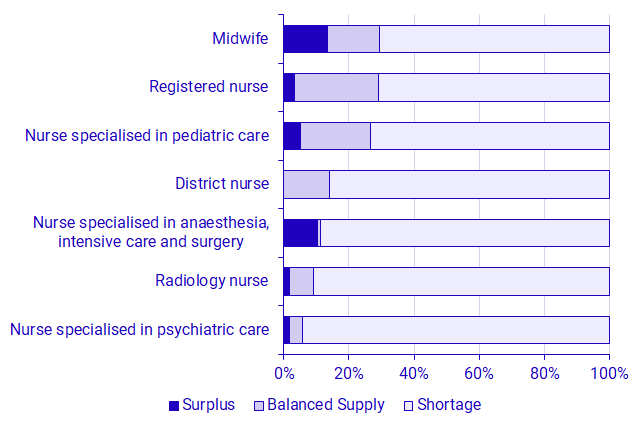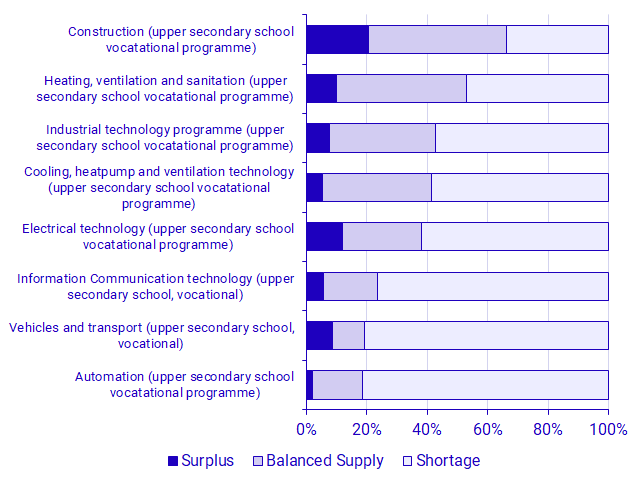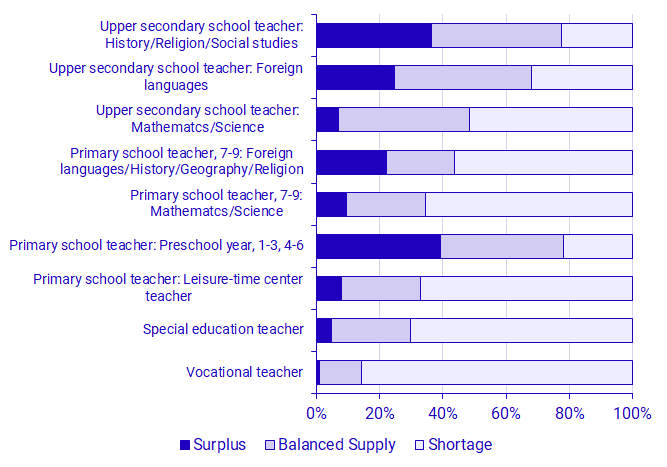Labour Market Tendency Survey 2023
Shortages of graduates in healthcare and technology
Statistical news from Statistics Sweden 2023-12-13 8.00
The Labour Market Tendency Survey 2023 finds major shortages in individuals with education and training in the fields of healthcare and technology. In the coming three years employers expect increased demand for engineers. Those specialised in electrical engineering, energy production, electronics, data science, and automation are pointed out as groups that will be particularly sought after.
– Shortages of qualified applicants are especially prevalent in the healthcare and technology sectors. According to Karolina Eriksson, statistician at Statistics Sweden, specialist nursing fields such as psychiatric and surgical nursing, are examples of educational areas where employers find difficulty recruiting qualified staff. Employers also report shortages of graduates from upper secondary vocational training programs within technical fields such as automation and transport.
The Labour Market Tendency Survey is a yearly survey showing how employers themselves experience the supply of prospective employees with specific educational backgrounds. This implies that the information that is acquired about the labour market comes directly from those working with recruitment.
As well as searching for prospective employees with required educational backgrounds, employers also desire relevant work experience. Recruitment demand for new graduates generally increases when there is a shortage of more experienced applicants, so a shortage of new graduates also implies a shortage of more experienced persons with a specific educational background.
Being a survey, the estimates in The Labour Market Tendency Survey come with a degree of uncertainty. The margins of error in this study are relatively high compared to many other surveys. Therefore, the results should be interpreted with caution. The margins of error are presented along with the results in the Statistical database.
The most extreme shortage was reported for specialist nurses
Most employers in the healthcare sector report shortages of prospective employees in 15 out of the 18 healthcare fields included in the survey. Approximately 9 out of 10 employers face difficulties finding graduates within specialist nursing in psychiatric care, surgery, intensive care, and radiology.

Pharmacy and social work are educational fields where the employers experience a balanced supply.
Employers struggling to find graduates of vocational education
Like previous years, the Labour Market Tendency Survey 2023 reports shortages of graduates from upper secondary vocational training programmes. Approximately 8 out of 10 employers report shortages of graduates specialised in automation, transport, and Information Communication Technology (ICT).

High demand for engineers in the coming years
The Labour Market Tendency Survey 2023 reports a balanced supply of recently graduated engineers.
Approximately 8 out of 10 employers of engineers expect to increase their recruitment of engineers over the next three years. The need for engineers within electrical engineering, energy production, electronics, data science and automation is expected to be especially strong.
The supply of graduates with an educational background in architecture is reported to be good or balanced. This implies more applicants competing over vacancies.
Continued shortage of vocational teachers
The demand for teachers varies depending on the specialties of the teachers and on demographic factors such as the sizes of specific age cohorts. Demand is also affected by policy decisions that can change over time, such as the target number of teachers per student and investments in specific areas.
A shortage in vocational teachers has been reported consistently since this type of teacher was included in the survey in 2019. Vocational teachers work both at the upper secondary school and college levels. For many of the fields taught, there is a corresponding shortage of working professionals.
Employers also report difficulty recruiting special needs teachers. Approximately 7 out of 10 employers report a shortage of graduates with this teaching specialty. Surplus or balanced supply is, however, reported by 8 of 10 employers for primary school teachers.
” We are in the process of educating one of our own teachers to a special needs teacher in mathematics since there were no applicants with the required qualifications applying for the position.” Headmaster, primary education year 7 – 9, the region of Jönköping.

Surplus or balanced supply of social science graduates
Most employers report a surplus or balanced supply of law graduates. The same applies to recently graduated librarians.
For medical secretaries, however, approximately 6 out of 10 employers report a shortage of applicants.
Sciences, agriculture, forestry, and veterinary medicine
Graduates within the areas of the sciences, agriculture, forestry, and veterinary medicine are often recruited by pharmaceutical companies, companies active in agriculture and forestry and government agencies.
The supply of individuals educated within these fields varies, but employers report a continued shortage of veterinarians and those with an upper secondary education in land management. Shortage is also reported for foresters. The supply for recently graduated physicists, agronomists, chemists, and biologists is balanced.
Definitions and explanations
The Labour Market Tendency Survey is a yearly survey that provides information on the current labour market situation and prospects for the coming years. Questions are posed regarding the supply of applicants (Surplus/Balance/Shortage), and how employers expect the number of employees with backgrounds in specific educational programmes represented at their workplaces will change a year from now and in three years from now (Increase/No change/Decrease).
The survey is conducted every year in August and includes 71 educational programmes, of which 13 are upper secondary school level and 58 are in higher level education.
Publication
The results from the Labour Market Tendency Survey are published in the Statistical Database. Time series, including margins of error, for all educational programmes from 2005 to 2023 are presented there.
The results for 2023 will be the last published within the context of the Labour market Tendency Survey. As of 2024 the Labour Market Tendency Survey will be replaced by a new survey, Job Openings and Recruitment needs.
Statistical Database
More information is available in the Statistical Database
Feel free to use the facts from this statistical news but remember to state Source: Statistics Sweden.
